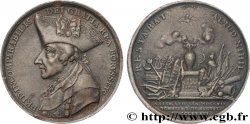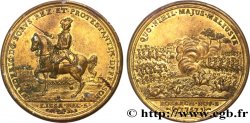E-auction 306-225283 - fme_475772 - GERMANY - KINGDOM OF PRUSSIA - FREDERICK II THE GREAT Médaille de la bataille de Prague
You must signin and be an approved bidder to bid, LOGIN TO BID. Accounts are subject to approval and the approval process takes place within 48 hours. Do not wait until the day a sale closes to register. Clicking on « bid » constitutes acceptance of the terms of use of cgb.fr private e-auctions.
Bids must be placed in whole Euro amounts only. The sale will start closing at the time stated on the item description; any bids received at the site after the closing time will not be executed. Transmission times may vary and bids could be rejected if you wait until the last second. For further information ckeck the E-auctions F.A.Q.
NO BUYER'S FEE.
NO BUYER'S FEE.
| Estimate : | 180 € |
| Price : | 33 € |
| Maximum bid : | 41 € |
| End of the sale : | 25 February 2019 18:29:30 |
| bidders : | 7 bidders |
Type : Médaille de la bataille de Prague
Date: 1757
Mint name / Town : Allemagne
Metal : bronze
Diameter : 48 mm
Orientation dies : 12 h.
Engraver HOLTZHEY Johann Georg (1729-1808)
Weight : 38,48 g.
Edge : Lisse
Coments on the condition:
Présence de taches. Patine hétérogène
Obverse
Obverse legend : FRIDERICVS MAGN. D. G. REX BORVSS. FL. BRAND. DVX SILES ET.
Obverse description : Buste cuirassé de Frédéric II de Prusse à droite.
Reverse
Reverse legend : FAMA. PRVDENTIA ET VIRTVTE, (LÉGENDE CIRCULAIRE) // AVSTIR. EXERC. PROPE. PRAG. EVNDIT / CÆSO ET PRAGA OBSESSA / VI MAJI MDCCLVII., (À L’EXERGUE).
Reverse description : Personnification de la Victoire ailée au centre, tenant la foudre, donnant un coup de pied dans la couronne de l’impératrice autrichienne Maria Theresia agenouillée ; bouclier iinscrit «VICTORIA FRIDERI / CI MAGN.” ; ALBISIL et MOLDA inscrit sur deux cruches, canon et armure en trophée.
Commentary
Médaille attribué au graveur hollandais Johann Georg Holtzhey (1729-1808).
Lors de la guerre de Sept Ans, la bataille de Prague voit, le 6 mai 1757, la victoire des Prussiens commandés par Frédéric II sur les Autrichiens de Charles-Alexandre de Lorraine. Le général autrichien Maximilian Ulysses Browne y est mortellement blessé, de même que le feld-maréchal prussien Curt Christophe de Schwerin. Cette victoire prussienne est suivie par le siège de Prague (mai-juin 1757) (en) mais Frédéric II, battu à la bataille de Kolin le 18 juin, doit se retirer et ne peut s'emparer de Prague.
Frédéric II de Prusse, dit Frédéric le Grand (en allemand, Friedrich der Große), né le 24 janvier 1712 à Berlin, mort le 17 août 1786 à Potsdam, de la maison de Hohenzollern, est roi de Prusse de 1740 à 1786, le premier à porter officiellement ce titre1. Il est simultanément le 14e prince-électeur de Brandebourg. Il est parfois surnommé affectueusement der alte Fritz (le vieux Fritz). Agrandissant notablement le territoire de ses États aux dépens de l'Autriche (Silésie, 1742) et de la Pologne (Prusse-Occidentale, 1772), il fait entrer son pays dans le cercle des grandes puissances européennes. Ami de Voltaire, il est l'un des principaux représentants du courant du «despotisme éclairé»..
Lors de la guerre de Sept Ans, la bataille de Prague voit, le 6 mai 1757, la victoire des Prussiens commandés par Frédéric II sur les Autrichiens de Charles-Alexandre de Lorraine. Le général autrichien Maximilian Ulysses Browne y est mortellement blessé, de même que le feld-maréchal prussien Curt Christophe de Schwerin. Cette victoire prussienne est suivie par le siège de Prague (mai-juin 1757) (en) mais Frédéric II, battu à la bataille de Kolin le 18 juin, doit se retirer et ne peut s'emparer de Prague.
Frédéric II de Prusse, dit Frédéric le Grand (en allemand, Friedrich der Große), né le 24 janvier 1712 à Berlin, mort le 17 août 1786 à Potsdam, de la maison de Hohenzollern, est roi de Prusse de 1740 à 1786, le premier à porter officiellement ce titre1. Il est simultanément le 14e prince-électeur de Brandebourg. Il est parfois surnommé affectueusement der alte Fritz (le vieux Fritz). Agrandissant notablement le territoire de ses États aux dépens de l'Autriche (Silésie, 1742) et de la Pologne (Prusse-Occidentale, 1772), il fait entrer son pays dans le cercle des grandes puissances européennes. Ami de Voltaire, il est l'un des principaux représentants du courant du «despotisme éclairé»..








 Report a mistake
Report a mistake Print the page
Print the page Share my selection
Share my selection Ask a question
Ask a question Consign / sell
Consign / sell
 Full data
Full data



